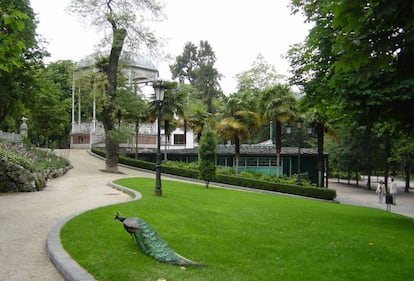Elderly Spanish couple end up sleeping in park after being evicted from home
Associations say social services should have been alerted to provide alternative accommodation


On September 18, an elderly Spanish couple were evicted from their home in Oviedo in Asturias. They left all their belongings in the flat save for “a few things,” which they took with them to a park in the city. No one knew their whereabouts. For the next two nights, the couple, aged 74 and 72, slept on a park bench.
The story has outraged the Mortgage Victims Platform (PAH), an association that fights for the right to decent housing, and which argues that judges must inform social services when a vulnerable family is going to be evicted. Given the couple were over 65, they qualify as one of the groups at risk of exclusion under an agreement reached between Spain’s legal watchdog, the CGPJ, the regional government and the Asturian Federation of City Councils (FACC).
The Spain of 2018 cannot allow two seniors to sleep on the street
Judge Pilar Martínez
But the judge overseeing the case did not take this step because he did not know how old the couple were, according to chief magistrate Pilar Martínez. The eviction order only included the rental contract, which simply stated that the couple were adults, she says. The couple did not explain their dire situation, so no action was taken to contact social services or regional or local authorities, she explains.
PAH however says the court failed to comply with the agreement, which was signed in March specifically to avoid these situations. The president of PAH, Pilar Galán, says the regional agreement promised to ensure judges and legal personnel were familiar with the pact and knew what protocol to follow.
“The man went to the courts to see how he could stop the eviction and he was told the judge and the lawyer were on vacation and that there was nothing that could be done in his case because he didn’t have a public defender and had not opposed the process,” explains Galán.
The PAH says the couple had become deeply indebted because they could not afford the rent on their flat, where they had lived for over a decade. The two survived on the woman’s pension, which was around €370, and did not cover the more than €400 needed for rent. The man, who had worked as an independent contractor until he was 70, was not receiving any income, because he had been unable to pay his social security contributions during the financial crisis, meaning he was ineligible to claim a public pension.
“It’s a vicious circle,” says Galán about the cycle of debt the couple found themselves in. “They felt responsible and did not want to involve their family.”
Many families continue to be pushed out of their homes but the problem has been “silenced,” says PAH
The married couple had told no one about their economic woes. Instead they silently left their home and all their belongings and went to sleep in a park.
“Did the judicial committee not find it odd that the key was in the door and all their things inside?,” asks Galán, in reference to the court envoys who oversaw the eviction. “Something was happening here.”
On September 20, two days after being evicted, the retirees approached Oviedo City Hall and the municipal organization We Are Oviedo (Somos Oviedo) alerted PAH to their situation. The association raced to bring the couple to social services before its offices closed and help them find somewhere to stay. But both regional authorities and social services say the couple refused their offers for alternative accommodation.
With the help of PAH, which also offered unsuccessfully to provide funds to pay for a hotel room, the couple have now found a place to stay, in the house of one of their friends. “The resources are still there for them but we can’t force them to take them,” said Oviedo City Hall.
The regional government, meanwhile, has said that it cannot “intervene to stop an eviction” if they do not know the “circumstances” of those involved.
PAH argues that what happened to the retired couple shows “the complete helplessness” suffered by people who are evicted for failing to pay their rent. Despite the official messages saying that Spain’s economy is recovering, many families continue to be pushed out of their homes, but the problem has been “silenced,” says Galán.
The man went to the courts to see how he could stop the eviction and he was told the judge and the lawyer were on vacation
PAH president Pilar Galán
“Before PAH received a lot of media attention because we were fighting the banks but now most of the cases are about unpaid rent,” she adds.
According to data from the CGPJ, almost 60% of evictions approved by the courts last year were in rental properties, a figure that is on the rise. “In Spain there is still an eviction every eight minutes,” says Galán.
In the next meeting over the provision to protect at-risk families from eviction, PAH plans to introduce measures to improve how these situations are handled and identified. Judge Martínez admits that in the case of the two retirees there was not enough information and has promised to “use all means” to “try to improve the protocol” so the situation does not happen again.
“The courts have been concerned about this issue for a long time and in 2017 we had a protocol that was used as the basis for the agreement,” says Martínez. “The Spain of 2018 cannot allow two seniors to sleep on the street.”
English version by Melissa Kitson.
Tu suscripción se está usando en otro dispositivo
¿Quieres añadir otro usuario a tu suscripción?
Si continúas leyendo en este dispositivo, no se podrá leer en el otro.
FlechaTu suscripción se está usando en otro dispositivo y solo puedes acceder a EL PAÍS desde un dispositivo a la vez.
Si quieres compartir tu cuenta, cambia tu suscripción a la modalidad Premium, así podrás añadir otro usuario. Cada uno accederá con su propia cuenta de email, lo que os permitirá personalizar vuestra experiencia en EL PAÍS.
¿Tienes una suscripción de empresa? Accede aquí para contratar más cuentas.
En el caso de no saber quién está usando tu cuenta, te recomendamos cambiar tu contraseña aquí.
Si decides continuar compartiendo tu cuenta, este mensaje se mostrará en tu dispositivo y en el de la otra persona que está usando tu cuenta de forma indefinida, afectando a tu experiencia de lectura. Puedes consultar aquí los términos y condiciones de la suscripción digital.








































